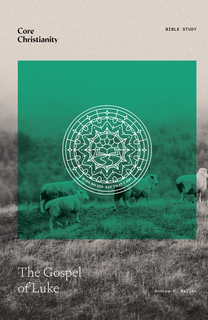Luke records two unique responses to what God is doing through the births of both John and Jesus. First, Mary responds to the words of her cousin Elizabeth by breaking into a prophetic song in vv. 46–55. Mary’s words clearly and powerful echo other songs of praise sung by Israelites of generations past in response to the mighty works of God.[1] Her song connects what God is doing through her and the child in her womb to Israel’s history. Luke’s story is deeply rooted in the Old Testament, and we see this in the way that Mary pulls together different strands from Israel’s lyrical past to celebrate the coming salvation of God.[2]
Mary’s song begins with her own personal story. Mary, God’s humble servant, has been irrevocably blessed. All generations will call her blessed, she says; this is an astonishing reversal! Mary isn’t the child of a famous priestly family, like Zechariah and Elizabeth (Luke 1:5). She doesn’t serve in the temple or have any royal lineage. She is simply a normal Israelite woman. And yet, although she humbly refers to herself as the servant of God (Luke 1:38), Gabriel, the angel who stands in the presence of God himself (Luke 1:19), calls her “highly favored one ” (Luke 1:28). Mary’s status is reversed from lowly obscurity to divine honor! This pattern of reversal continues throughout the rest of Mary’s song: God is the one who is powerful, not the proud; the mighty are stripped of their thrones and the lowly are exalted; the hungry are fed and the rich are sent away. The coming of God’s salvation is characterized by a reversal of earthly power structures and giving honor to those who are oppressed and looked down upon. Just like God has blessed his servant Mary, so he will powerfully help his servant Israel and remember his promises to Abraham by finally bringing salvation to his people.
All of this is rooted in God’s own character as the God who shows mercy. Joel Green observes that “[t]he God Mary praises is the covenant-making God, the God who acts out of his own self-giving nature to embrace men and women in relationship. God remembers … and acts.”[3] God’s work on our behalf in Christ is not arbitrary. As Mary’s song powerfully reminds us, our salvation is a continuation of God’s actions throughout history, it’s anchored in his very nature as a God who has mercy upon those he has called to himself, and it’s directed at the complete reversal of the powers of sin and death.
The second response is that of Zechariah, whose previous muteness is now replaced by a torrent of Spirit-filled prophetic praise. Zechariah takes up several themes that resonate with Mary’s song, including God’s faithfulness to the patriarchs and his enduring mercy to his people. However, Zechariah is not simply praising God in a general way; he is prophesying. Zechariah declares that God has raised up “a horn of salvation for us in the house of his servant David” (Luke 1:69), foretold by the prophets, which can only be referring to the unborn Jesus.
Although Zechariah doesn’t explicitly mention Jesus by name, this is the most specific statement so far in Luke about who Jesus is and what he’s there to do. Ironically, although Zechariah initially reacts in disbelief when Gabriel first visits him in the temple, once his tongue is released by the Holy Spirit, Zechariah begins to understand what God is doing, and how John, his own son, fits into God’s purposes.
These responses come from two very different people. Although Zechariah and Mary are both responding to similar circumstances, i.e., the miraculous birth of a promised child, their roles in God’s unfolding plan are quite different. Nevertheless, both of these characters’ prophetic words point us to an appropriate reliance upon God and his ability to act on our behalf. Mary sings of God restoring justice to the world by reversing the imbalances caused by human sin; Zechariah prophesies the restoration of his people and their rescue from their enemies. All of this, from the lifting of the lowly to the triumph of God’s king over the enemies of the nation, is inspired by God’s clear action on behalf of his people in the coming of the Messiah.
This is an excerpt from our brand new Core Bible study, The Gospel of Luke.
[1] For example, Moses and Miriam in Exodus 15, Deborah in Judges 5, and Hannah in 1 Samuel 2.
[2] Green, The Gospel of Luke, 101.
[3] Green, Gospel of Luke, 105.






